Reverse piracy: Fast-food brands in Pakistan unaware of affiliates in UK
Trademark rights of many food businesses have been breached in UK.

Trademark rights of many food businesses have been breached in UK. CREATIVE COMMONS
While the likes of McDonald’s, KFC, Hardee’s and many other fast-food brands have entered the Pakistan market – with international protection of their registered trademarks, patents and secret recipes – a number of successful Pakistani culinary brands are being replicated in the UK and other western countries without permission or even knowledge of the original owners.
The Pakistani food businesses that have successfully expanded into the UK include Salt’n Pepper and Bundu Khan. Others whose trademark rights have been infringed upon include Gourmet, Nirala, Ambala, Shezan and some others.
Apart from the expansion of Pakistani brands, a number of local British-Pakistani brands have also thrived in different cities throughout the country. Mumtaz in Bradford and Nawaab in Manchester are two prominent examples of success of Pakistani restaurants in the UK.
Regarding traditional Pakistani confectionery, Nirala has emerged as a premier brand, although Nirala in the UK has no links or association with the Nirala brand in Pakistan. The owners of Nirala in the UK have registered their trademark there, potentially blocking the entry of the original Pakistani Nirala should they wish to expand into the UK.
Although the original Nirala has registered a company in the UK, it has yet to open its first branch in the country. The owners of the UK Nirala have also registered Gourmet as their own brand – without the permission of the original Gourmet in Pakistan – and are opening a branch on Ilford Lane in London.
Interestingly, there already exists another Gourmet shop almost opposite the proposed new “registered” Gourmet shop on the same road. Apparently, the existing Gourmet and the registered Gourmet are involved in a lawsuit in the UK, while the original Gourmet in Pakistan is completely unaware of this legal battle being fought on its brand.
All this underscores the need for developing a global Pakistani culinary brand. This can be done by setting up a Pakistan Global Gastronomy Fund, with the aim of developing a global culinary business of Pakistani foods, including but not limited to setting up restaurants all over the world. In this respect, there is a need to identify strategic locations for Pakistani businesses in major cities of the world.
In the UK, for example, there are over 70 takeaways, sheesha houses, sweet shops and other food outlets along what is now known as the Curry Mile on Wilmslow Road in Rusholme, Manchester. Most of these restaurants and takeaways are owned by Pakistani and Bangladeshi families.
Bangla Town
In Malaysia, Little India is a thriving region in central Kuala Lumpur, which is a hub of a number of Indian businesses, including restaurants and other outlets selling Indian food. Perhaps the best and most relevant example for the proposed hub of Pakistani food in an overseas location is the area around East London Mosque. This area presents an example of what may be termed Bangla Town and it will be difficult and hence unwise to suggest that this area should be developed as a hub for Pakistani food.
This model should be studied to develop hubs for Pakistani foods in areas that are predominantly Pakistani, ie, in cities like Manchester and Bradford. London’s Bangladeshi community has done a wonderful job by developing a localised Islamic economy around the East London Mosque, which is one of the largest mosques in the UK.
On one side of the mosque is the famous Brick Lane, which houses a number of Bangladeshi restaurants. There are scores of wholesale shops for Bangladeshi fabrics and garments in the streets adjacent to Brick Lane.
There are two famous restaurants behind the East London Mosque – Tayyab’s (Pakistani) and Maedah (Turkish), which have thriving business throughout the week, particularly on Fridays.
Pak Street
There is a need to study the phenomena of Chinatowns, and now Bangla Towns, in major cities of the world to develop what may be named as Pak Street.
The proposed fund should also invest in a Pakistan School of Gastronomy, which should offer professional qualifications in Pakistani gastronomy, in addition to developing a centre of excellence for research in the field. There is a need to set up a department of law, specialising in national, regional and international trademarks and registration of businesses in different parts of the world to protect Pakistani brands.
Otherwise, some upstarts in countries like the UK, USA and other countries will continue to unethically benefit from the most successful traditional brands from Pakistan.
the writer is an economist and PhD from Cambridge University
Published in The Express Tribune, May 5th, 2014.
Like Business on Facebook, follow @TribuneBiz on Twitter to stay informed and join in the conversation.



















COMMENTS
Comments are moderated and generally will be posted if they are on-topic and not abusive.
For more information, please see our Comments FAQ